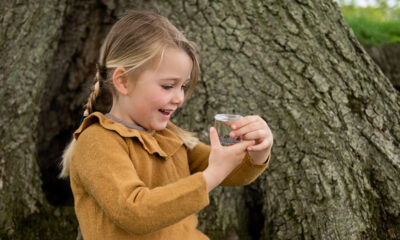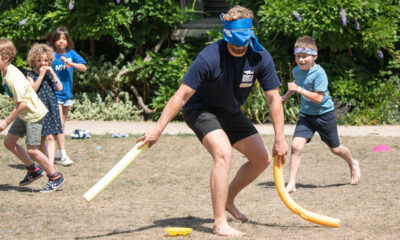Advice
Activities for Neurodiverse Kids | Engaging ADHD Kids


Expert / 15 July, 2024 / My Baba
Supporting neurodiverse children through activities means recognizing their unique strengths, interests, and challenges. Activities for neurodiverse kids should be flexible, inclusive, and designed to meet various sensory, social, and developmental needs.
Here are some activities to support neurodiverse children, including those with autism, ADHD, and sensory processing disorders:
Activities to support neurodiverse kids
Sensory Bins
Fill containers with different materials like rice, beans, sand, or water beads to encourage tactile exploration and fine motor skills. These can be calming but must be supervised to prevent choking.
Water Play
Engage in water activities like playing with water tables, using spray bottles, or floating toys. Water play helps with sensory integration, has calming effects, and enhances fine motor skills. Ensure comfortable water temperature and set up in a splash-friendly area.
Play Dough or Slime
Using play dough or slime in various textures and colors supports sensory processing, fine motor development, and creativity. Offer scent-free or less sticky options if needed.
Art and Craft Projects
Activities like painting, drawing, and collage-making enhance fine motor skills, self-expression, and creativity. Provide diverse materials to match sensory preferences and offer step-by-step guidance as needed.
Sensory Paths
Create pathways with different tactile materials for walking, jumping, or hopping. Sensory paths improve proprioception, balance, and provide sensory input, making for a fun physical activity.
Social Stories and Role-Playing
Illustrated stories or role-playing games can help practice social scenarios, developing social skills, understanding cues, and managing anxiety. Tailor scenarios to your child’s experiences and use visual aids or puppets for engagement.
Group Games
Turn-based games like board games or cooperative video games foster teamwork, turn-taking, and social interaction. Choose games that align with your child’s interests and cognitive level, allowing for flexible rules.
Buddy Reading
Pair children to read books together, taking turns or reading simultaneously. This encourages social bonding, improves literacy skills, and builds empathy. Select enjoyable books and create a comfortable reading space.
Music and Movement
Dancing, playing musical instruments, or rhythm games support motor coordination, auditory processing, and emotional expression. Use noise-cancelling headphones for sound sensitivity and choose music with a comfortable tempo.
Tips to Keep Neurodiverse Children Engaged
- Choose activities that match your child’s interests and strengths.
- Use clear language and visual aids to explain activities, breaking tasks into manageable steps.
- Modify activities to suit your child’s needs and comfort levels to reduce anxiety and increase enjoyment.
- Ensure a safe and welcoming activity space, minimizing sensory overload.
- Foster social engagement through group activities or one-on-one interactions in a supportive manner.
- Encourage your child to take initiative and make choices, building confidence and self-reliance.
- Provide encouragement and praise to motivate and support participation.
- Be patient and understanding, recognizing that each child’s pace and approach to activities will vary.
Learn more about supporting neurodiverse children here.
READ NEXT
Helping Dyslexic Children Recognise Their Unique Thinking Skills Beyond Exams
Parental Control, Ep: 102 Neurodiversity And Nutrition With Expert Lucinda Miller
-

 Destination8 months ago
Destination8 months agoSingapore Airlines CEO set to join board of Air India, BA News, BA
-

 Breaking News10 months ago
Breaking News10 months agoCroatia to reintroduce compulsory military draft as regional tensions soar
-

 Gadgets3 months ago
Gadgets3 months agoSupernatural Season 16 Revival News, Cast, Plot and Release Date
-

 Tech News12 months ago
Tech News12 months agoBangladeshi police agents accused of selling citizens’ personal information on Telegram
-

 Productivity11 months ago
Productivity11 months agoHow Your Contact Center Can Become A Customer Engagement Center
-

 Gadgets3 weeks ago
Gadgets3 weeks agoFallout Season 2 Potential Release Date, Cast, Plot and News
-

 Breaking News10 months ago
Breaking News10 months agoBangladesh crisis: Refaat Ahmed sworn in as Bangladesh’s new chief justice
-

 Toys12 months ago
Toys12 months ago15 of the Best Trike & Tricycles Mums Recommend























